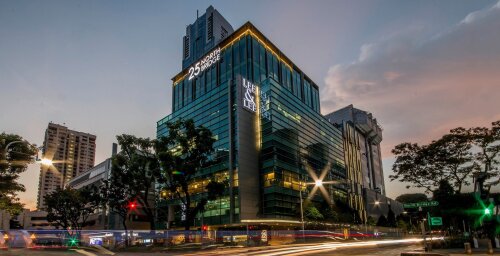Best Art & Cultural Property Law Lawyers in City Hall
Share your needs with us, get contacted by law firms.
Free. Takes 2 min.
List of the best lawyers in City Hall, Singapore
About Art & Cultural Property Law in City Hall, Singapore
Art & Cultural Property Law in City Hall, Singapore, focuses on the legal frameworks that protect and regulate the ownership and transfer of art and cultural objects. This field encompasses a broad range of issues, including intellectual property rights, heritage protection, the circulation of art and cultural goods, and recovery of stolen or illicitly traded assets. Singapore, known for its rich cultural tapestry and flourishing art scene, has been actively developing its legal landscape to support and safeguard its cultural heritage. Key legislation includes the Cultural Property (Export and Import) Act and the National Heritage Board Act, which align with international standards aimed at preserving cultural heritage assets while fostering cross-border cooperation.
Why You May Need a Lawyer
Individuals or organizations may need legal assistance in Art & Cultural Property Law for various reasons, including:
- Acquiring, selling, or lending artwork or cultural objects.
- Navigating intellectual property issues around art creation or reproduction.
- Disputes over provenance or ownership of artifacts.
- Compliance with national and international regulations for importing or exporting cultural property.
- Ensuring the authenticity and ethical provenance of artwork.
- Resolving disputes related to theft, misappropriation, or recovery of cultural assets.
- Understanding inheritance tax implications on art collections.
- Documentation and due diligence concerning cultural property transactions.
Local Laws Overview
Key aspects of local laws relevant to Art & Cultural Property Law in City Hall, Singapore, include:
- Cultural Property (Export and Import) Act: Regulates export and import of cultural property to prevent illicit trade and supports the restitution of cultural objects.
- National Heritage Board Act: Governs the protection and management of national heritage including monuments and sites of historical significance.
- Intellectual Property Law: Covers copyright, patents, trademarks, and designs related to artistic and creative works ensuring creators' rights are protected.
- Singapore Patents Act: Provides protection for artistic methods and innovative processes relevant to art creation.
- International Treaties: Singapore is a signatory to several international conventions, such as the UNESCO 1970 Convention, which addresses illicit trade of cultural property.
Frequently Asked Questions
What constitutes cultural property under Singapore law?
Cultural property includes objects, artifacts, and sites of historical, artistic, or archaeological significance which have cultural importance attached to them.
How can I verify the authenticity of a piece of art?
Engage a reputable expert for evaluation and request provenance documentation that traces ownership history. Legal advice may help assess compliance with legal standards.
What should I do if I find out a piece of art I purchased was stolen?
Immediately report to the National Heritage Board and consult a lawyer specialising in art law for guidance on restitution and legal recourse.
Are there tax benefits related to art donations in Singapore?
Yes, donations of cultural property to institutions listed on the National Heritage Board can offer tax benefits. Consultation is recommended to understand applicable tax relief options.
What are the legal obligations when exporting art from Singapore?
Ensure compliance with the Cultural Property (Export and Import) Act, including necessary permits and verification procedures. Legal advice ensures proper adherence to regulations.
Can a lawyer help with copyright issues for my artwork?
Yes, a lawyer can assist with registering, enforcing, and defending your copyright claims, as well as negotiating licensing agreements.
Is legal protection available for digital art in Singapore?
Digital art is protected under copyright law as it involves creative expression. Legal advice can ensure coverage for digital formats and technological implementations.
How do I handle disputes over cultural property inheritance?
Seek legal mediation or arbitration services for disputes resolution, and consult a lawyer for advice on estate planning to prevent future conflicts.
What role does the National Heritage Board play in Singapore?
The National Heritage Board oversees preservation of national heritage, manages heritage sites, ensures compliance with heritage legislation, and offers public education.
What are the penalties for illegal possession or trade of cultural artifacts in Singapore?
Penalties vary based on the offense but may include fines and imprisonment. Engaging a legal consultant is crucial to navigating such situations.
Additional Resources
For further assistance, consider reaching out to the following resources:
- National Heritage Board: Provides guidance on cultural preservation and compliance.
- Intellectual Property Office of Singapore (IPOS): Offers resources and services for intellectual property matters.
- Singapore Art Museum: May provide insights and connections for art and cultural property matters.
Next Steps
If you need legal assistance in Art & Cultural Property Law:
- Assess Your Needs: Identify the nature of your issue or transaction to articulate your need for legal expertise.
- Consult a Lawyer: Seek legal counsel with specialization in Art & Cultural Property Law located in City Hall, Singapore.
- Gather Documentation: Prepare all relevant documentation, such as proof of ownership, appraisals, and prior legal correspondences for consultation.
- Stay Informed: Regularly review updates on relevant laws and participate in sector-related seminars or workshops.
Lawzana helps you find the best lawyers and law firms in City Hall through a curated and pre-screened list of qualified legal professionals. Our platform offers rankings and detailed profiles of attorneys and law firms, allowing you to compare based on practice areas, including Art & Cultural Property Law, experience, and client feedback.
Each profile includes a description of the firm's areas of practice, client reviews, team members and partners, year of establishment, spoken languages, office locations, contact information, social media presence, and any published articles or resources. Most firms on our platform speak English and are experienced in both local and international legal matters.
Get a quote from top-rated law firms in City Hall, Singapore — quickly, securely, and without unnecessary hassle.
Disclaimer:
The information provided on this page is for general informational purposes only and does not constitute legal advice. While we strive to ensure the accuracy and relevance of the content, legal information may change over time, and interpretations of the law can vary. You should always consult with a qualified legal professional for advice specific to your situation.
We disclaim all liability for actions taken or not taken based on the content of this page. If you believe any information is incorrect or outdated, please contact us, and we will review and update it where appropriate.













